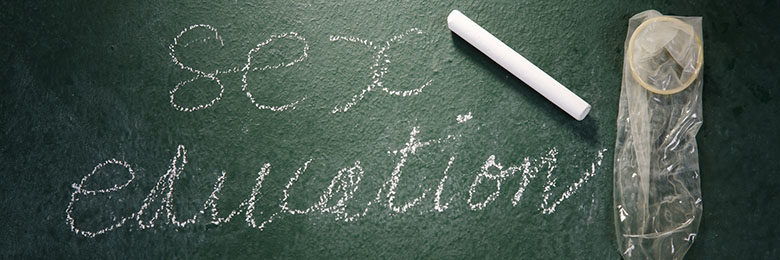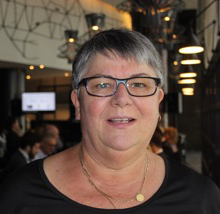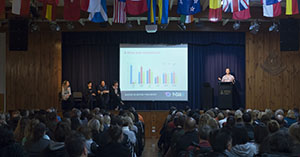
When I was young my mum handed me a book. The book was on puberty. She said, “Read that and come and find me if you’ve got any questions.” As you’ve probably already guessed, I never went to find her.
It’s really important parents understand where their kids are at in regards to their knowledge around sexual health. Having been young once too, many parents might think they instinctively know this, but the truth is, times have changed and parents might not know as much about the subject as they think they do. To find out, here’s a short quiz based on 5th National Survey of Secondary School Students on Sexual Health. Challenge your intuition. Some of the answers might surprise you.
Australian high school students: A sexual health quiz for parents
The National Survey of Secondary School Students on Sexual Health is a survey that’s conducted by La Trobe University and they do one every five years. The last one was conducted in 2015. In that survey, over 2000 young people in Years 10, 11, and 12 were asked questions around their sexual health. The survey was run through government schools, independent schools, Catholic schools across all jurisdictions in Australia.
So, read the questions below and have a guess as to what you think the answer might be. When you’re ready, click the icon to reveal the facts.
What percentage of Australian Year 10 students do you think are having vaginal or anal intercourse?
What percentage of Australian Year 12 students do you think are having vaginal or anal intercourse?
How do you think young people feel after having sex?
In the study, Year 10 to 12 students were also asked if they had ever experienced unwanted sex. What percentage Year 10 to 12 students do you think said they had, at some point, experienced unwanted sex?
What percentage of the above do you think were male?
When asked about their condom use in their last sexual encounter, what percentage of these young people do you think were using condoms?
If there were a condom available to them, how many would prefer to use it?
What percentage of young people do you think are using the withdrawal method of contraception?
What do you think the #1 source is that young people go to for information around sexual health?
We as parents, as well as teachers and other trusted adults still have a really important role to play. We need to create a safe space for young people to talk to us about their sexual health, and we need to listen to their questions and answer their questions as accurately as we can.
But that’s sometimes easier said than done.
At the very least, let them know there are places to go
I absolutely love working with young people.
I’ve now made it my job to talk about sex with young people and I’m more than willing to stand up in front of lots of people and talk about it. I work in a Reproductive & Sexual Health Clinic that’s part of Family Planning Victoria. It’s essentially a drop-in clinic for young people — anyone under the age of 25 who might need our help.
Something I see every day when I work in the clinic is a young person turning up really embarrassed, afraid and ashamed of what’s been happening to them. It might be helpful for parents to know what happens in a clinic like ours so here’s a bit of insight.
The first thing I have to do is to welcome them and assure them they’re in the right place. Next is to remind them that at their age they’re designed to experiment and explore. Sometimes you make mistakes but you’re in the right place now. It’s also my responsibility to give them information that will make them feel better and let them know that sex is meant to be positive and pleasurable.
I do all this while thinking about the law at the same time. I let them know that they have the right to access confidential healthcare and in doing so, I’ll be assessing them to make sure that they have the maturity to make decisions and to consent to any treatment or procedures while talking to them about the rules around sex and consent.
The legal age of consent in Victoria is 16 but the law varies between states – be aware of that. In Victoria if you’re between the ages of 12 to 15 and are involved in sexual activity, each participant must be within 24 months of each other’s age. Outside that, a person cannot have sex with you, touch you, or perform a sexual act in front of you.
I’m thinking about all of these things when someone presents to the clinic. We do a really thorough assessment. We ask things like where are you living? Who do you live with? Is there someone in your home that you feel comfortable talking to about your sexual health? Are you working? Are you engaged in school? What sort of activities are you doing out of school? Are you happy at school? Are you getting good grades? Do you have friends? Are you drinking or using drugs? Who are you having sex with? What sort of things are you doing? Are you using protection? Is it safe? Is it consensual?
We don’t just dish out pills and information and off they go. We’re really making sure we do a thorough assessment. In doing that, we can then give them information about contraception, talk to them about all their different options of contraception, how these methods work, how effective they are, potential side effects and whether it’s suitable for them.
We talk about sexually transmitted infections, how things are transmitted, possible signs and symptoms people might have, how to test for them and how to defend being exposed. We talk about unintended pregnancy too. This happens and counselling on unintended pregnancy is an important service we offer to young people. We talk to them about all their options and assist them with referrals.
One of our most important roles though is talking to them about safe, consensual, respectful relationships and how to have conversations and negotiate what you want out of that relationship.
Our collective role as parents, teachers and trusted adults in all of this is to create a space and environment for open discussion. To let them know that we are sexual beings and it’s normal to be doing these things, and allow them the opportunity to ask questions and to give them any information they may need. If we can communicate all that, then we will empower our young people to better look after their own sexual health.



